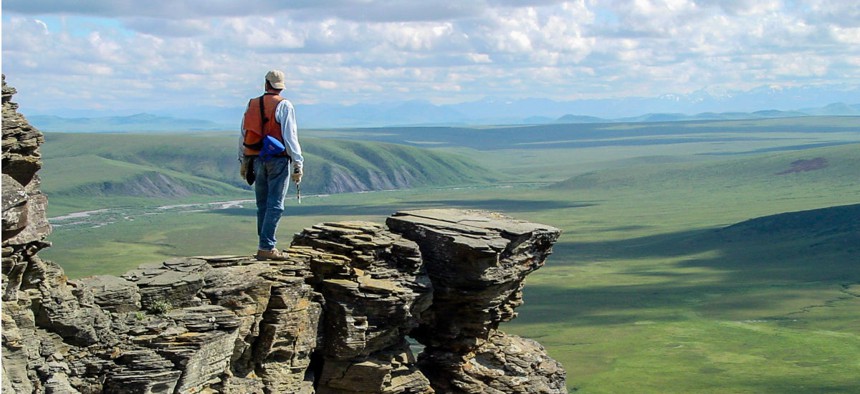
A geologist with the U.S. Geological Survey on an outcrop of Nanushuk Formation, Tuktu Bluff, Alaska. Dave Houseknecht/USGS
Watchdog Groups Create Guide to Help Feds Protect Themselves Against Political Misconduct
Extensive note taking can help federal scientists protect themselves and their work, experts say.
Federal scientists should write down all instances of agency personnel interfering with their work, a group of government watchdog and employee advocate groups warned this week. It will help them protect both themselves and their work.
Documenting potential abuses is particularly important “in a hostile environment for science,” the groups said, and will enable employees to protect their own careers and “uphold scientific integrity.” The groups issued a guide to federal scientists to prevent political misconduct titled “How Federal Scientists Can Protect Science for the Public Good,” in which they emphasized the importance of recording notes.
One key recommendation in the report is for federal employees to take contemporaneous notes, be it in meetings, on calls or as part of policy research or proposals. Those notes should be as detailed as possible, the groups said, and be dated and backed up to personal devices as long as the information is not classified.
The groups issued the guide after hearing from their members and in the media about the Trump administration tightening restrictions on the federal scientific community. Agencies have reportedly instructed employees not to use certain words, disbanded scientific advisory commissions and reassigned employees who speak out about issues the administration is no longer prioritizing.
“We’ve been hearing a lot of stories about people being told not to take notes, not to use certain words, not to have a paper trail,” said Andrew Rosenberg, a former regional director for the National Oceanic and Atmospheric Administration and current director of the Center for Science and Democracy at the Union of Concerned Scientists, which helped write the guide. Keeping records of what was discussed and when it was discussed is particularly important, Rosenberg said, when there is a “concerted effort” to undermine scientists across government. Last week, according to Mother Jones, a scientist at the U.S. Geological Survey resigned because he said Interior Secretary Ryan Zinke was given access to economically sensitive data before it was released to the public, a violation of the scientist's understanding of USGS policy.
“We are not suggesting that people subvert the process, Rosenberg said, “but simply that they keep a clearer record.”
Doing so, he said, will help feds rebut claims that they provided bad advice or did not present certain relevant information involved in a policy decision. If political leaders are involved in a “manipulation of the science,” Rosenberg added, contemporaneous note taking would help expose it. He explained that scientists in government are at risk of being scapegoated—“it’s not exactly unheard of,” he said—and detailed records would help protect both themselves and their research.
“Carefully documenting events as they occur is one of the most important means for holding government officials accountable,” said Louis Clark, executive director and CEO of the Government Accountability Project, a group that advocates for whistleblowers and another author on the guide. “Any federal employee who suspects wrongdoing, or even feels uncomfortable in the workplace, can help ensure corrective action. A detailed, authentic record is an essential tool in the whistleblower toolbox.”
To help create a paper trail, Rosenberg said employees can send meeting notes to colleagues or to supervisors to describe their takeaways, provided the supervisor did not specifically instruct them not to take notes. The guide advised employees to separate personal notes from agency records if they have any concerns about them becoming public or their managers seeing them. If an issue becomes problematic enough for an employee to share it with a scientific integrity office, a union, a journalist or another outside organization, notes can help demonstrate whether agency decisions were “arbitrary, capricious, politically driven or inadequately informed by the science.”
“Government scientists need to understand that they are protected by the same laws as other federal employees and can blow the whistle on censorship of science that creates a specific and substantial risk to health and safety,” said Danielle Brian, the executive director of the Project on Government Oversight, which also helped write the recommendations.
Rosenberg noted that concerns about the Trump administration crackdown on the scientific community is not isolated to any one agency.
“It goes across government to all the places where experts or scientists work, which is pretty much everywhere,” he said. “We’re hearing concerns.”
NEXT STORY: How Agencies Can Improve Grant Management







